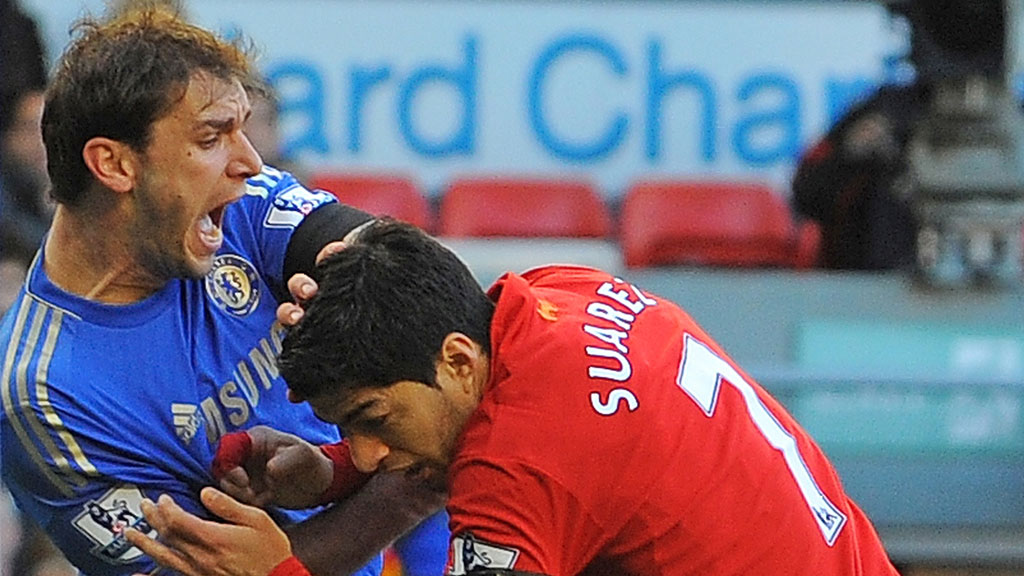‘Troubled’ Suarez – what makes a star player go rogue?
Luis Suarez is facing yet another ban after being accused of biting an opponent at the World Cup. But what makes such a talented footballer bare his fangs for a bite?

In Britain, Luis Suarez is known for two things: his brilliance as a striker – the English Premier League’s leading goal scorer last season and England’s nemesis in Brazil this month – and his occasional extreme behaviour on the football pitch.
He arrived at Anfield in January 2011 with baggage: he had recently served a seven-match ban at his previous club Ajax for biting an opposing player’s shoulder, and was remembered by millions across the world for costing Ghana victory in their 2010 World Cup quarter final clash against Uruguay by using his hand to prevent a goal (the Africans missed the subsequent penalty and the South Americans won the match).
But at Liverpool, it was soon obvious that Suarez deserved the accolades he had won in Holland, where he was named Dutch footballer of the year.
Racial abuse
All was going well until he was found guilty by the FA of racially abusing Manchester United’s Patrice Evra in October and banned for eight matches. There was more embarrassment for Liverpool when he avoided shaking Evra’s hand at the two clubs’ next meeting in February 2012.
As if this were not bad enough, in April 2013, Suarez was involved in another confrontation with a player, this time Chelsea’s Branislav Ivanovic, whom he bit on the shoulder.
Suarez on the couch
Dr John Mathers, a sports psychologist at Stirling University, told Channel 4 News: "He must be troubled - perhaps troubled from something in his history and past. His coping mechanism to deal with frustration may well be to lash out. Liverpool have tried very hard to help and support him, but it would appear those efforts were in vain. This manifestation of internal trouble may be deep-rooted indeed."
This is despite the attentions of his sports psychiatrist Dr Steve Peters, whose "background in psychiatry might make him ideally placed to provide a working solution for a player with this particular need". Dr Mathers added: "Imagine someone has a propensity to behave in a certain way when pressure builds. With rehabilitation you might be able to push up the threshold so it happens less often, but eradicating it completely might take considerable time, effort and commitment from the player."
On Suarez's biting history, Dr Mathers said: "You would need to find out from him: did he behave like this as a young person? It is something he learned at a young age from his environment, but it is obviously still there within him and has not been controlled as of yet." He also said that Suarez found it hard to handle criticism. "It's selective attention. For every 10 to 20 people who have praised him, there are one or two who do not. Maybe he needs universal praise."
The 2013 attack, which seemed to be motiveless, left thoughtful viewers feeling that the Uruguayan had been attempting to smother the pressure he was under in a high-profile match by lashing out in frustration.
As someone at the top of his trade, Suarez sets himself extremely high standards and if everything is not going his way – attacks are breaking down, goals are not forthcoming – the red mist descends.
Villain and hero – destroyer and creator

The irony is that his bite was not seen by the referee when it happened (action was taken retrospectively) and Suarez went on to equalise for his team in the dying moments of the match. Villain and hero – destroyer and creator – in the space of a few minutes.
A 10-match ban for violent conduct followed, but he ended the season as the Premier League’s second highest scorer.
Despite agitating to leave Liverpool, Suarez was persuaded to stay for the 2013-14 season. He flourished, scoring more goals than any other player and managing to keep his nose clean.
Plaudits
He was then honoured with player of the year awards from his fellow footballers and sports writers, having played a pivotal role in his team’s return to top-flight European football in the Champions League after finishing second in the league, an agonising two points behind winners Manchester City.
He was one of many Liverpool players to receive the attention of Dr Steve Peters, a sports psychiatrist who worked with the Team GB cycling team and was drafted in to help England’s World Cup squad.
After a magnificent season, Suarez was set for another outing on the international stage at the World Cup. Playing against several of his Liverpool teammates, he was the best player on the pitch, scoring both of victorious Uruguay’s goals.
His post-match reaction was strangely bitter, attributing his motivation for a fine performance to the slights he has received from English media critics – usefully forgetting that these critics had voted him player of the year a few months earlier, and seemingly oblivious to the fact that that on occasions his behaviour has been rightly criticised.
What followed has just been beamed around the world, just like his misdemeanours at the 2010 World Cup in South Africa: triumph for his team and another astonishing loss of control by Suarez.